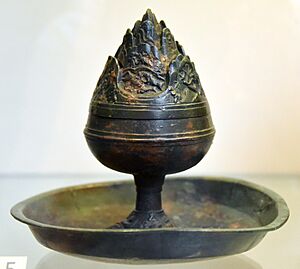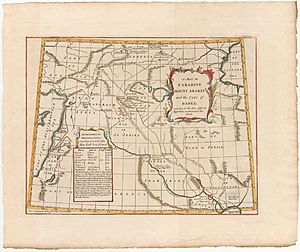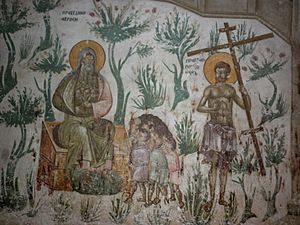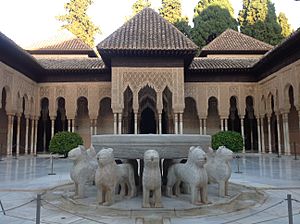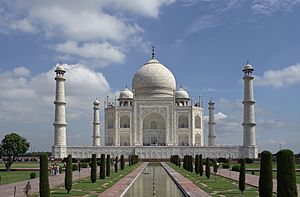Paradise facts for kids
In many religions, paradise is a wonderful place of lasting happiness and joy. People often imagine paradise as a beautiful garden or a peaceful countryside. It is usually seen as a perfect place, very different from the problems and sadness of human life. In paradise, there is only peace, good times, and happiness. It is a place of deep satisfaction, full of comfort and never-ending joy. Paradise is often thought of as a "higher place" or the holiest place, unlike our world or underworlds like Hell.
In some beliefs about what happens after death, paradise is where good people go when they die. For example, in Christianity and Islam, Heaven is seen as a kind of paradise. Ancient Egyptians believed their underworld, Aaru, was a paradise of perfect hunting and fishing grounds for the dead. The Celts imagined it as the Fortunate Isle of Mag Mell. The ancient Greeks believed in the Elysian Fields, a rich land where heroes and good people would live forever. In Buddhism, paradise and heaven are similar, with higher levels for those who have been very virtuous and meditated deeply. For Zoroastrians, the "Best Existence" and "House of Song" are places for the good people who have passed away.
Sometimes, 'paradise' also describes the world as it was before anything bad happened to it. The idea of paradise is a common theme in art and books, especially from before the Enlightenment. A famous example is John Milton's book Paradise Lost.
Contents
What "Paradise" Means: A Look at Its History
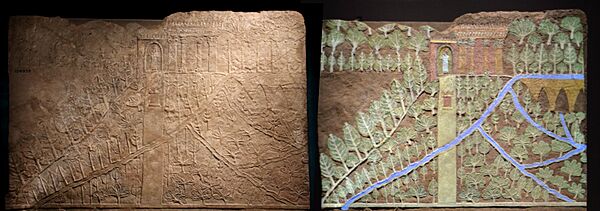
The word "paradise" came into English from the French word paradis. This word came from the Latin paradisus, which came from the Greek parádeisos (παράδεισος). The Greek word came from an Old Iranian word, which meant "walled enclosure" or a garden surrounded by walls.
This Old Iranian word was borrowed into other languages. By the 6th or 5th century BCE, it was used in Assyrian as pardesu, meaning "domain." Later, it described the large, walled gardens of the First Persian Empire. The Greeks then borrowed it as παράδεισος parádeisos, meaning "park for animals." This happened in the early 4th century BCE in the writings of Xenophon. It also entered Aramaic as pardaysa ("royal park") and Hebrew as פַּרְדֵּס pardes, meaning "orchard."
In ancient Greek translations of the Hebrew Bible (called the Septuagint), parádeisos was used for both the Hebrew words pardes and gan (meaning "garden"). This is how "paradise" became linked to the Garden of Eden. The same idea also appears in Arabic and the Quran as firdaws (فردوس).
Over time, the idea of a "walled enclosure" was not always kept in Iranian languages. The word often just meant a cultivated area or a garden, not necessarily walled. For example, in modern Persian, Pardis and pālīz mean a vegetable patch.
Paradise in the Bible
The Hebrew Bible
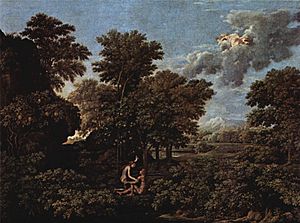
The Hebrew word pardes appears in the Bible after the Jewish people returned from exile (after 538 BCE). It is found in the Song of Songs 4:13, Ecclesiastes 2:5, and Nehemiah 2:8. In all these places, it means "park" or "garden," just like its original Persian meaning. It describes the royal parks of Cyrus the Great.
In Judaism during the time of the Second Temple, "paradise" became connected to the Garden of Eden. It also became linked to ideas about the restoration of Eden and was sometimes used to mean heaven.
In an old Jewish story called the Apocalypse of Moses, Adam and Eve are sent out of paradise (not just Eden) after they are tricked by the serpent. After Adam dies, the Archangel Michael takes Adam's body to be buried in Paradise, which is in the Third Heaven.
The New Testament
The Greek word παράδεισος (paradise) appears three times in the New Testament:
- In Luke 23:43, Jesus speaks to a thief on the cross. The thief asks Jesus to remember him when he enters his kingdom. Jesus replies, "Truly I tell you, today you will be with me in paradise." Many people believe this means they would both go to a special resting place for the dead.
- In 2 Corinthians 12:4, Paul describes a third heaven that is paradise.
- In Revelation 2:7, it mentions the tree of life, which was also in the Garden of Eden.
Paradise in Judaism
In Jewish eschatology (beliefs about the end of time), the higher Gan Eden is called the "Garden of Righteousness." It is believed to have existed since the beginning of the world and will appear in glory at the end of time. Good people living there will see God's throne carried by heavenly beings. Everyone who is good will walk with God and dance with Him. Both Jewish and non-Jewish people there will be "clothed with garments of light and eternal life" and eat from the tree of life near God. This idea of a higher Gan Eden is the opposite of gehinnom and sheol, which are places for spiritual cleansing for the wicked.
Rabbinic Judaism
In modern Jewish beliefs about the future, it is thought that history will end when all people return to the Garden of Eden.
In the Talmud and Kabbalah (Jewish mystical teachings), scholars agree there are two kinds of spiritual places called "Garden in Eden." The first is like a very fertile garden on Earth, known as the "lower Gan Eden." The second is a heavenly place where good, immortal souls (both Jewish and non-Jewish) live. This is called the "higher Gan Eden." Rabbis say that Adam only lived in the Gan, but Eden itself has never been seen by humans. In Rabbinic Judaism, the word 'Pardes' is used, but less often for Eden. A famous story, the Pardes story, uses the word to mean mystic philosophy.
The Zohar, a mystical text, gives the word 'Pardes' a deeper meaning. It connects it to four ways of understanding the Bible: peshat (literal meaning), remez (hint), derash (deeper meaning), and sod (mystical meaning). The first letters of these four words form פַּרְדֵּס – p(a)rd(e)s. This was seen as representing the four levels of understanding the Torah, with the mystical meaning being the highest.
Paradise in Christianity
In the 2nd century AD, Irenaeus said that paradise was different from heaven. He wrote that only those who were truly worthy would go to heaven. Others would enjoy paradise, and the rest would live in the restored Jerusalem. Origen also saw paradise as separate from heaven. He described paradise as an earthly "school" for the souls of good people, preparing them to rise through the heavens to reach heaven.
Many early Christians thought Abraham's bosom was paradise. This was a place where the souls of good people waited until the resurrection of the dead. Other Christians, like St. Augustine, had different ideas about what paradise was.
In Luke 23:43, Jesus tells a thief on the cross, "Truly I tell you, today you will be with me in paradise." This is often understood to mean that on that very day, the thief and Jesus would enter a resting place for the dead who were waiting for the Resurrection. There are different ways this verse has been punctuated and understood over time.
In Christian art, Fra Angelico's painting Last Judgement shows Paradise on its left side. It features a tree of life and a joyful circle dance of freed souls.
Jehovah's Witnesses
Jehovah's Witnesses believe that God's original plan was for the Earth to be a global paradise, cared for by the children of Adam and Eve. However, Adam and Eve disobeyed God and were sent out of the Garden of Eden into a life of hard work and suffering.
Jehovah's Witnesses believe that bad people will be destroyed by Christ at Armageddon. Those who obey Christ will live forever in a restored earthly paradise. People who died before Armageddon, both good and bad, will be brought back to life. The bad ones are resurrected because their death paid for their sins or because they never had a chance to learn God's rules. They will be judged based on how they obey new instructions after they are resurrected. They believe that Christ's blood and his ransom sacrifice make it possible for the dead to be resurrected to paradise on Earth.
When Jesus was dying, he told a man next to him, "you will be with me in Paradise." The New World Translation puts a comma after 'today', making it "I tell you today, you will be with me in Paradise." This is different from other translations. Jehovah's Witnesses believe Jesus would be resurrected after three days, so he couldn't have been in paradise on the same day he died.
Mormonism
In Latter Day Saint beliefs, paradise usually refers to the spirit world. This is where spirits live after death while they wait to be resurrected. In this sense, "paradise" is the state of good people after they die. In contrast, wicked people and those who haven't learned about Jesus Christ wait for resurrection in spirit prison. After everyone is resurrected, they will be assigned to a specific kingdom or level of glory. This final state can also be called "paradise."
Paradise in Islam
In the Quran, Heaven is called Jannah (which means garden). The highest level of Jannah is called Firdaus, which is paradise. It is the ultimate joyful place after death for those who pray, give to charity, and believe in Allah, the angels, his holy books, his prophets, the Day of Judgment, and God's plan (Qadr). They must also follow God's will in their lives. In Islam, Heaven also means the skies or the whole universe. The joys and beauty of Heaven in Islam are so great that human minds cannot fully imagine them.
There are eight doors to Jannah, which represent eight levels:
- 1. Jannah al-Mawa
- 2. Dar al-Maqam
- 3. Dar al-Salam
- 4. Dar al-Khuld
- 5. Jannah al-Adn
- 6. Jannah al-Na'im
- 7. Jannah al-Kasif
- 8. Jannah al-Firdaus
Jannah al-Mawa is the lowest level, Jannah al-Adn is in the middle, and Jannah al-Firdaus is the highest.
Imam Bukhari recorded that the Prophet Muhammad said:
'When you ask from Allah, ask Him for Al-Firdaus, for it is the middle of Paradise and it is the highest place and from it the rivers of Paradise flow.' (Bukhari, Ahmad, Baihaqi)
This tradition says Al-Firdaus is the highest place, but also in the middle. The scholar Ibn Hibban explained that "in the middle" means it is central in terms of width and breadth, while "highest place" means it is on a height. Abu Hurairah also said, "Al Firdaus is a mountain in Paradise from which the rivers flow."
The Quran also warns that not all Muslims or believers will surely enter Jannah. Only those who have struggled for God and faced trials, like the prophets, will enter:
Or do you think that you will enter Paradise while such [trial] has not yet come to you as came to those who passed on before you? They were touched by poverty and hardship and were shaken until [even their] messenger and those who believed with him said,"When is the help of Allah ?" Unquestionably, the help of Allah is near.
— Qur'an 2:214 (Al-Baqarah) (Saheeh International)
Other parts of the Quran describe paradise with springs, silk clothes, fancy carpets, and beautiful women. These ideas are also shown in Islamic art and buildings.
"The semblance of Paradise (Jannah) promised the pious and devout (is that of a garden) with streams of water that will not go rank, and rivers of milk whose taste will not undergo a change, and rivers of wine delectable to drinkers, and streams of purified honey, and fruits of every kind in them, and forgiveness from their Lord." (47:15).
Water Features in Islamic Gardens
The Alhambra, Court of the Lions, Grenada, Spain The design of the gardens at the Alhambra in Grenada shows how water can represent paradise in Islamic gardens. The Courtyard of the Lions, for example, has a calm water fountain in its center. Water flows from the mouths of stone lions. The still water in this courtyard creates a peaceful atmosphere, much like the paradise described in the Quran.
Tomb Gardens as Representations of Paradise
It is not fully proven that Islamic gardens were only meant to show images of paradise. However, some writings and designs suggest that artists wanted to create a feeling of holiness and peace.
Tombs became like a "paradise on Earth" in Islamic architecture and gardens. They were seen as a place of eternal peace where religious people could rest.
The Taj Mahal Outside the Taj Mahal tomb, there are writings from the Quran on the walls. These writings talk about the Day of Judgment and paradise. The tomb is placed within a garden with water features, which connects it to the idea of paradise in the Quran. The white marble used for the tomb also adds to the feeling of purity and holiness, making the tomb seem like paradise.
Mosaic Representations of Paradise in Islamic Architecture
Old writings from an interview with an artist who worked on the Prophet's Mosque in Medina (between 705 and 715) show that the mosaic pictures of gardens in this mosque were made "according to the picture of the Tree of Paradise and its palaces." Other buildings from the same time with similar natural mosaics likely had the same goal.
The Mosaic of the Dome of the Rock, Jerusalem Built between 690 and 692, the Dome of the Rock in Jerusalem has a large, detailed mosaic inside its dome. This rich mosaic likely aimed to show an image of paradise. It features fruit trees, plant designs, and flowing rivers. Along with beautiful writing, the mosaic shows symmetrical plant scrolls and trees made of blue, green, and turquoise mosaics. Jewel-like decorations and gold paint complete the mosaic. These mosaics not only tried to show paradise as described in the Quran but also celebrated Muslim victories.
The Mosaic of The Great Mosque of Damascus, Syria Similarly, the mosaic in the Great Mosque of Damascus, built around the same time as the Dome of the Rock, shows clear elements of a paradise garden from the Quran. It is very likely that this mosaic on the outside of the Great Mosque of Damascus also aimed to create an image of paradise in the viewer's mind.
Paradise in Gnosticism
In Gnosticism, an ancient religious belief, a text called On the Origin of the World describes Paradise. It is located outside the path of the Sun and Moon, in a lush Earthy area to the east, among stones. The Tree of Life, which will provide for the souls of good people after they leave their bodies, is in the north of Paradise. Next to it is the Tree of Knowledge, which holds God's power.
See also
 In Spanish: Paraíso para niños
In Spanish: Paraíso para niños
 | George Robert Carruthers |
 | Patricia Bath |
 | Jan Ernst Matzeliger |
 | Alexander Miles |



